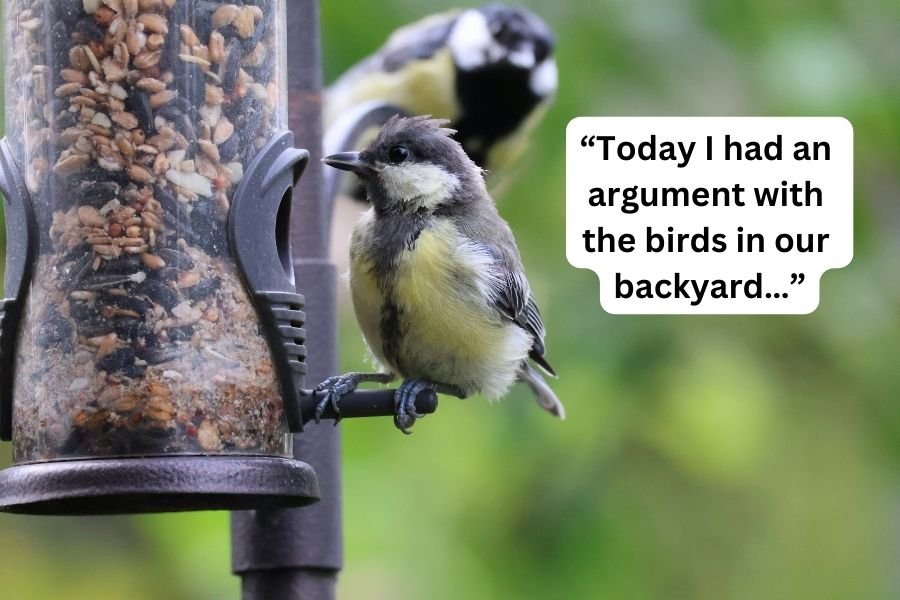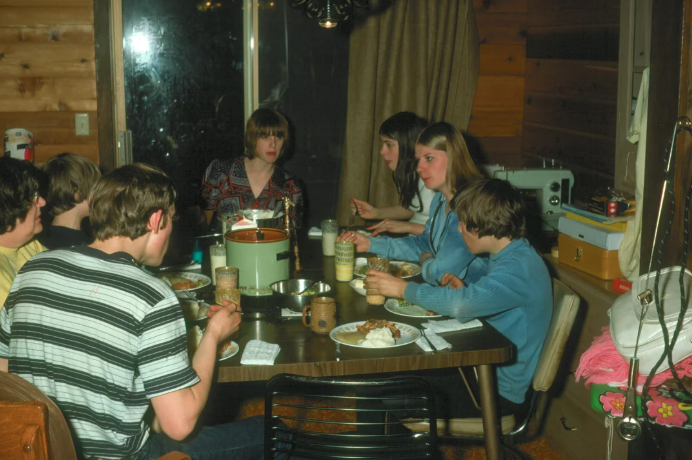Aging is a funny thing. You start off young and excited and eager to get older, and then at some point you reach a point where getting older becomes less fun and more…achy.
Your 40s is generally when you start to feel aging hit in random ways. Healthy living can help fend off a lot of aging woes, but not everything. And it’s not even just bodily aging that manifests in your 40s. It’s things like needing to sleeping less, realizing exactly how dumb you were in your 20s and developing a sudden, inexplicable fascination with birdwatching.
Or bird arguing, as the case may be.
Someone who identifies as Xennial (on the cusp of Gen X and millennial) shared a “Life in your 40s” confessional about an argument they got into with the birds in their yard, which prompted others to share their own mid-life quirks.
The post read:
“Today I had an argument with the birds of our backyard.
I took down the bird feeder to fill it and all the foliage had a cacophony of noises as if to say, ‘Took you long enough.’ This was not the happy sounds of birds loving life. This was the sounds of demands. I told them I’ve been busy and they’ll just have to wait.
I then decided to shift the hummingbird feeder a bit because lately I’ve been banging into it despite having it in the same spot for several years.
I shit you not, as I was on the ladder a hummingbird came over and hovered near me giving me the death stare. I told her that I was just moving it and to give me a second.
My god what has happened to me?
What’s your recent ‘life in your 40s’ story?
Update: The hummingbird has come back several times now rather pissed the feeder has moved 3 inches. She won’t drink out of it, but keeps checking to see if I have put it back.
Update 2: After hours of me telling her I’m not moving it, she finally drank. I win.”
Other Reddit users’ 40-something stories did not disappoint.
Some had their own bird encounters to share:
“My husband is hell bent on befriending the local crows. He bought a 25 lb. bag of peanuts and throws a handful out on to the deck every morning. They’re getting more and more comfortable eating closer to the house, and now they ‘summon’ him with aggressive caws if he’s late putting out their breakfast. His goal is to Disney Princess it at some point. #lifegoals”
“Hahaha I am the crazy bird lady in our neighborhood and my husband says it’s like a scene from Snow White when I open the backdoor to let the dog out. All the birds and usually a chipmunk go flying!”
Someone shared this classic:
Bird watching sneaks up on you
byu/Due-Paramedic8532 inXennials
And another added:
“Well, I’m glad it’s not just me.
I’m 42, and last summer I really started feeding the birds, but I’d intentionally let the feeder go empty for a day or two. My goal was that they’d eat some of the yellow jackets that are frequently hovering near my south facing wall. They bitched an absolute ton when I would fill the feeders. They would eat the yellow jackets though.
Then, this last fall, my cameras caught me singing ‘Muh birds, muh birds, gonna feed muh birds’ while carrying my bag of seeds. I was happy as clam. The wifey showed me, and the kids, the footage. Now, whenever I’m feeding the birds, my middle son starts singing it to me.
I used to chase bad guys, with a gun, and a taser (I was in law enforcement for a decade, I fix robots now.) Now, I have an eleven year old harassing me because I’m nice to the local wildlife.”
There were also lots of body betrayal experiences:
“If I sit for too long it’s exhausting and I have to go lay down and get some rest.”
“I slept funny last night, and I don’t think I’ll ever recover.”
“No joke. I literally slept weird 4 weeks ago and have been dealing with a pinched nerve in my neck ever since. Went from 42 to feeling 82 overnight.”
“Last week I sneezed while in the shower and threw my back out.”
“If I feel a sneeze coming when I am in the shower, I sit down. Standing shower sneezes are how you break a hip.”
“Can’t trust my lower GI to do anything right anymore.”
“I start peeing the second I head into the bathroom to pee.”
And a host of other random middle-agey realities:
“Complaining about the price of cereal.
No clue of today’s music.
Go big or go home? Buddy you didn’t even need to ask the question. Home.
Lastly, my daily word search.”
“I didn’t make it to the store today, and the window/will to leave my house has passed, so I’ll probably go another week without the items I intended to purchase today ?”
“My friend is having a pool day and I don’t want to go. I don’t want to take off my clothes and I really just want to chill in my house because I work tomorrow and I need a day to get ready.”
“I went to bed at 4pm and woke up at 11 on the 4th of July. 41 doesn’t hit like 21 did. ?”
“I’m 45, and my boyfriend is 32. We went through an exhibit Friday and he finished long before I did because I had to stop and read all the plaques and information, which I never use to do.”
“Yeah I just built a raised garden bed and am super excited to plant squash! Wtf happened to me….”
Here’s to the joys of aging! May your backs be limber and your birds be plentiful.





































